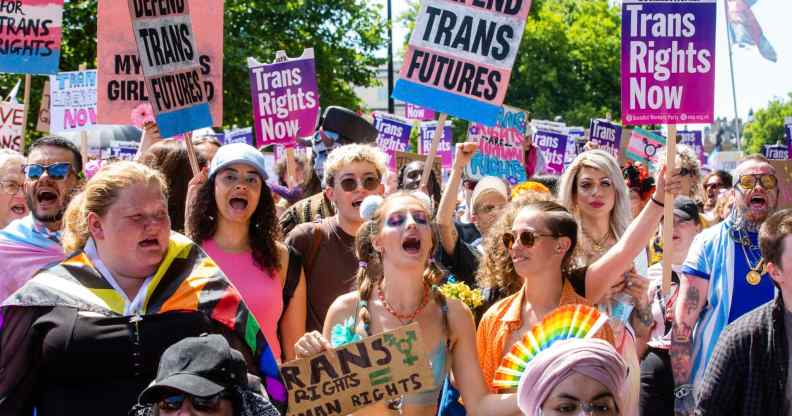UK equalities watchdog admits asking trans people to prove their ‘legal sex’ could be unlawful

The EHRC have sent two letters to the government saying they should consider its reform on gender recognition (Mark Kerrison/ Getty)
The Equality and Human Rights Commission (EHRC) has admitted that asking trans people for a gender recognition certificate could be unlawful.
The EHRC, Britain’s equalities watchdog, has faced increasing criticism for its stance on trans rights under the leadership of Baroness Kishwer Falkner, appointed as chair by Liz Truss in 2020.
In particular, the EHRC has been condemned for issuing guidance on how to exclude trans people from single-sex spaces, and for siding against the Scottish government on reforms to the Gender Recognition Act.
On the latter issue, the watchdog published two letters on Wednesday (5 October) acknowledging “the democratic mandate of the Scottish Government to legislate on these matters, and that there appears to be majority support to do so in the Scottish Parliament.”.
“The Commission recognises that the proposed reforms will undoubtedly make it easier for trans people,” the EHRC wrote.
However, it warned of “possible implications”, including that more progressive laws in Scotland would create a two-tier system across the UK.
The letter voiced concerns about how employers in England and Wales would be able to “determine a Scottish person’s legal sex” – noting that asking for a GRC or birth certificate in an attempt to out them as trans could be unlawful.
“In some cases, it could constitute unlawful discrimination for a service provider or employer to request to see a GRC, given that other groups are rarely asked to meet a similar threshold,” the letters read.
The UK trans advocacy group LGBwiththeT said this suggested a U-turn in the EHRC’s previous comments on gender recognition certificates.
Leaked draft guidance in February showed that the watchdog once planned to advice businesses to only let trans people who possess a Gender Recognition Certificate (GRC) access single-sex spaces.
At the time, legal experts said this would be unlawful.
The new EHRC letters were addressed to cabinet secretary Shona Robison and equalities minister Nadhim Zahawai.
In a move that surprised pro-trans activists, they acknowledged that reforms would constitute an “important legal and personal recognition for many”, as well as the harm faced by trans people in the UK.
However, the letters also suggested that reforms could undermine “provisions relating to sex discrimination, including equal pay between women and men, gender pay gap report, and measures to address disadvantages experienced by women”.
5/ This is all very important, and very useful stuff!
This is a complete U turn from the suggestions made about trans people by the EHRC, and the suggestions made towards people holding a GRC.
This is going to cause a lot of waves!
— LGBWithTheT (@LGBwiththeT) October 5, 2022
The letters recognised that trans people are “a marginalised group who already experience poorer outcomes in many areas of life.”
They clarify that the organisation is opposed to allowing 16 and 17-year-olds to change their legal sex, as per the Scottish proposals, while also recognising that “16 is the legal age of the majority in the UK”.
“However, while we defer to the Scottish Human Rights Commission (SHRC) on devolved issues, we note that the UN Convention on the Rights of the Child defines anyone under 18 as a child,” it read. “Our role requires us to consider the implications of the proposals for the rights of children and young people in England and Wales… With Scottish GRCsin other parts of the UK.”
It suggested that: “The Commission remains wholly committed to protecting the rights of trans people, including through the use of our enforcement powers to tackle discrimination and harassment.”
Stonewall Scotland and Northern Ireland director Colin Macfarlane said that the organisation welcomed the letter, but believes that the intervention “continues to undermine [the EHRC]s] credibility”.
“Up until February this year, the commission were supportive of the proposals and they have so far failed to provide any evidence to back up their newfound opposition to moving to a de-medicalised model for legal recognition.”
The EHRC was condemned in January 2022 after it wrote a similar open letter to the Scottish Government urging it to halt a GRA reform to allow what it called further “consideration.”
It suggested that GRA reform would negatively affect “drug testing in competitive sport” and “measures to suggest barrier facing women,” while citing no evidence within the letter to back up these claims.
When asked to provide evidence to Scottish MSPs in May, EHRC policy director Alasdair MacDonald claimed the effects of self-ID were “still emerging.”
This is despite countries such as Ireland introducing self-ID in 2015.
“Our emphasis has been less about any abuse of the system but rather understanding the implications of broadening access to this process,” he said.
Stonewall and 20 other LGBTQ+ groups have lobbied for the EHRC to be downgraded by the the UN-affiliated Global Alliance of National Human Rights Institutions (GANHRI) – the alliance declined to conduct a special review, but is due to carry out a scheduled one this month.

